What Do I Really Want?
Meditation with Gerald Blomeyer
at
N O M A D
Berlin, Sunday 24th May 2015
The cause of happiness is our own mind: motivation leads to thoughts,
thoughts lead to actions,
actions to results.
The word karma means action.
If you want to change the things happening to you look at the programming of your mind.
Your mind is often controlled by your emotions.
You are not your thoughts, habits, personality.
You have thoughts, habits and personality.
As long as you don’t realize that your real enemy is within you, you will never recognize that the mind of attachment is the root of all the problems your body and mind experience. All your worries, depression and everything else come from that.
-- Lama Yeshe
"If you set out without a clear vision of what you are doing and where you’re trying to go, how can you tell if you’re on the right path? How can you tell if you’ve gone wrong? It’s a mistake to act blindly.
Buddhism is less interested in what you do than why you do it—your motivation.
The mental attitude behind an action is much more important than the action itself."
Lama Yeshe
We consistently create patterns in our lives but often fail to see the cause and effect relationship that unfolds.
Karma speaks to the way in which we respond to that which comes to us, to the life that we are given.
It’s not the action but the intention that is the source of karma.
Jack Kornfield
We only have a limited time to live
the life we choose ourselves
What do I really want?
Death is definite.
The time of death is indefinite.
Nothing else can help at the time of death except the Dharma.
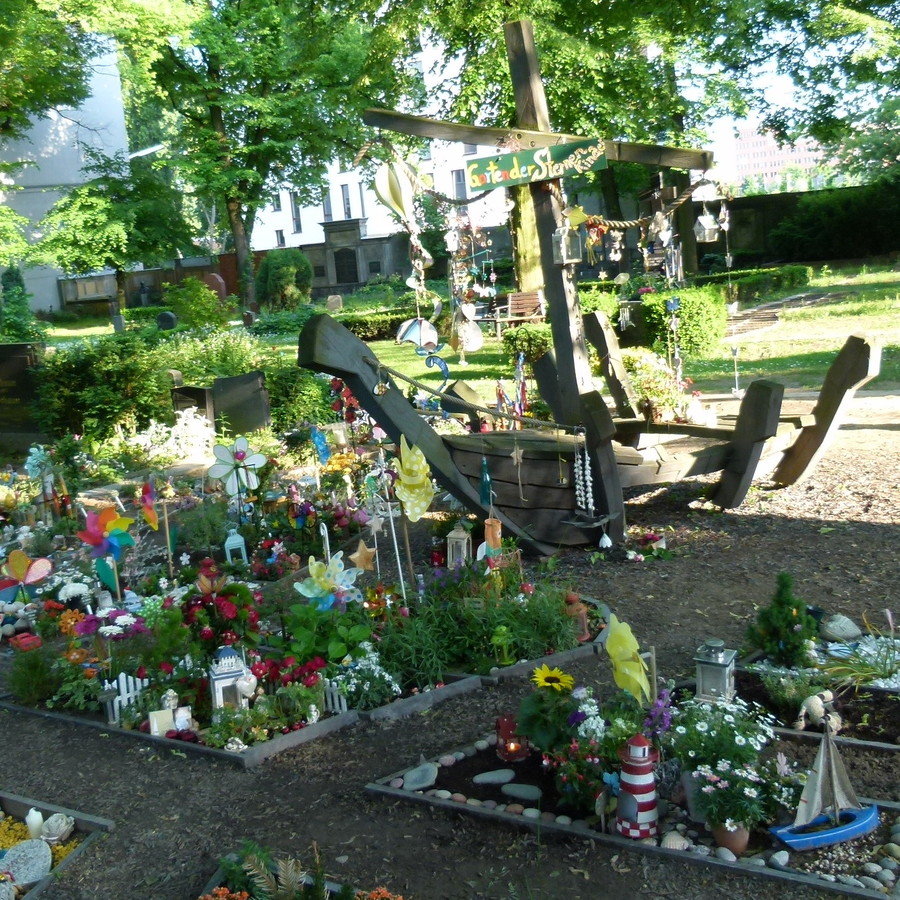
Garden of the "star children", cemetery Berlin Kreuzberg
Put on a half-smile and take three slow deep breaths.
Breathe normally.
Attend to the rhythm of your breath.
Become aware of your body and any physical sensations.
With the outbreath relax any tension in your body.
Become aware of what is going on in your mind.
Let go of your inner dialogue and return to your breath.
Meditation is the balance of
relaxation and awareness
Meditation 1
Death and Dying
Reviewing your life so far
What if?
Individual dimension
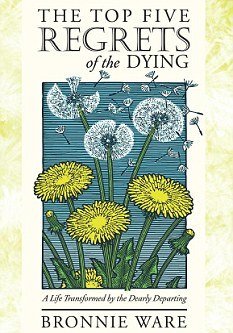
1. I wish I'd had the courage to live a life true to myself, not the life others expected of me.
"This was the most common regret of all. When people realise that their life is almost over and look back clearly on it, it is easy to see how many dreams have gone unfulfilled. Most people had not honoured even a half of their dreams and had to die knowing that it was due to choices they had made, or not made. Health brings a freedom very few realise, until they no longer have it."
2. I wish I hadn't worked so hard.
"This came from every male patient that I nursed. They missed their children's youth and their partner's companionship. Women also spoke of this regret, but as most were from an older generation, many of the female patients had not been breadwinners. All of the men I nursed deeply regretted spending so much of their lives on the treadmill of a work existence."
3. I wish I'd had the courage to express my feelings.
"Many people suppressed their feelings in order to keep peace with others. As a result, they settled for a mediocre existence and never became who they were truly capable of becoming. Many developed illnesses relating to the bitterness and resentment they carried as a result."
4. I wish I had stayed in touch with my friends.
"Often they would not truly realise the full benefits of old friends until their dying weeks and it was not always possible to track them down. Many had become so caught up in their own lives that they had let golden friendships slip by over the years. There were many deep regrets about not giving friendships the time and effort that they deserved. Everyone misses their friends when they are dying."
5. I wish that I had let myself be happier.
"This is a surprisingly common one. Many did not realise until the end that happiness is a choice. They had stayed stuck in old patterns and habits. The so-called 'comfort' of familiarity overflowed into their emotions, as well as their physical lives. Fear of change had them pretending to others, and to their selves, that they were content, when deep within, they longed to laugh properly and have silliness in their life again."
Meditation 2
Loving Kindness (B. Allen Wallace)
1) What would I love to receive from the world in order to have a happy, meaningful and fulfilling life?
- May all these authentic desires be fulfilled!
2) What would I love to receive from the people around me?
- Imagine that the world fulfills all your aspirations.
What sort of person would I become?
3) What would I like to offer the world and to those around me?
Expand your field of loving awareness to each living being.
- May each of you, like myself, find the happiness you seek, and may you cultivate its true causes!
Social dimension
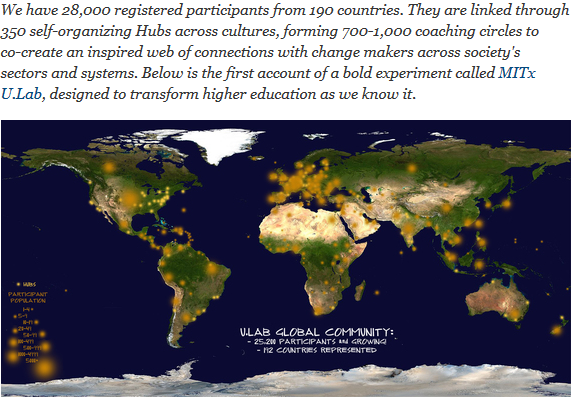
World dimension - U.LAB by Otto Scharmer
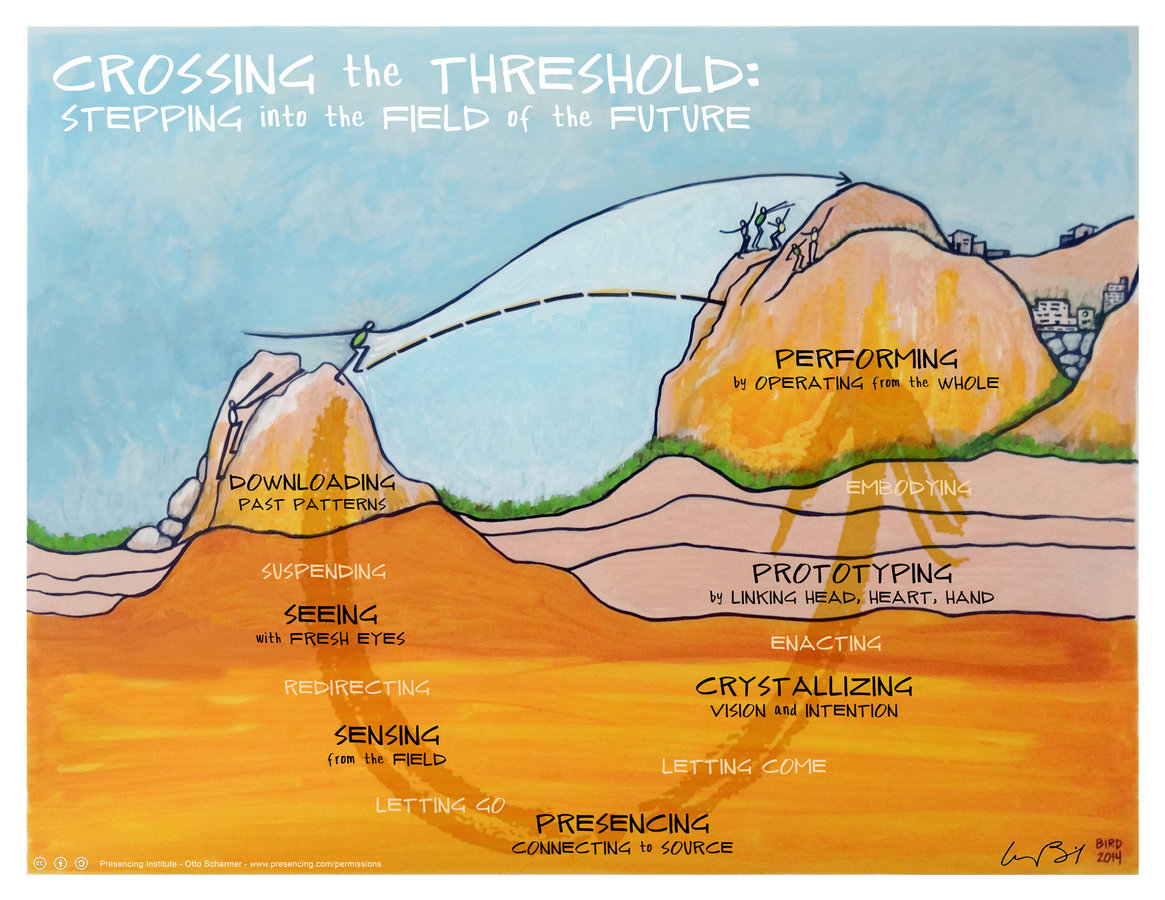
Otto Scharmer: Theory U: Leading from the Future as It Emerges
Individual, Social and World dimension
Presencing
The preparation for the experience at the bottom of the U requires the tuning of three instruments: the open mind, the open heart, and the open will. This opening process is not passive but an active "sensing" together as a group. While an open heart allows us to see a situation from the whole, the open will enables us to begin to act from the emerging whole.
Otto Scharmer www.presencing.com
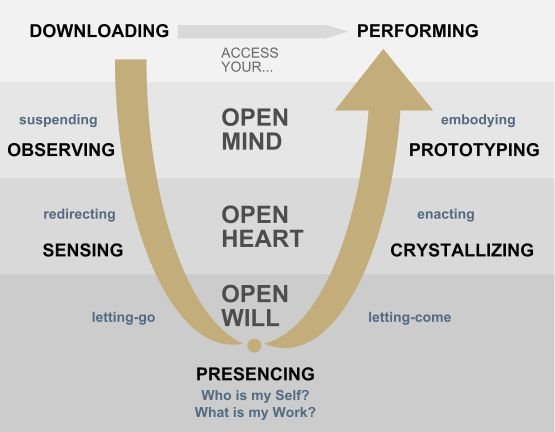

Meditation 3
Stillness: connecting to our sources of self-knowledge.
Who are you?
What do you love doing? (teaching)
Who do you do it for?
What do they want or need?
How do they change as a result?
Adam Leipzig, TEDxMalibu
How to know your life purpose
in 5 minutes
May we and all beings everywhere
live up to our full potential, and
live a life free of fear, failure, and sorrow.
May we and all beings everywhere
be truely happy and
never be separated from the causes of happiness.
Dedication
What Do I Really Want?
By Gerald Blomeyer
What Do I Really Want?
The cause of happiness is our own mind: motivation leads to thoughts, thoughts lead to actions, actions to results. If you want to change your results you have to look at the programming of your mind. With inner causes we create outer ones, and can then experience the external conditions for happiness. Gerald started meditating more that 25 years ago. He recently returned from an eight year sojourn in India and Nepal. He teaches meditation, Buddhism and yoga at seminars in Berlin and Hamburg.
- 1,581

